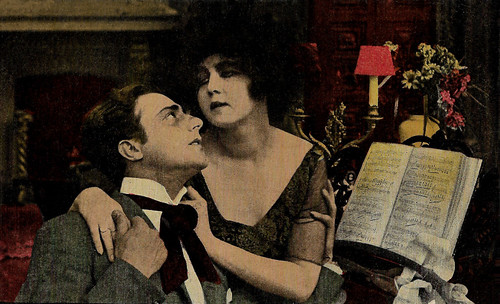
Spanish cromo (collectors card) by Chocolat Imperiale, Card 1 of 6. Photo: Gladiator Film / Distr. J. Verdaguer, Barcelona. Angelo Vianello and Helena Makowska in Folgore (Ugo De Simone, 1919), released in Spain as El Rayo.
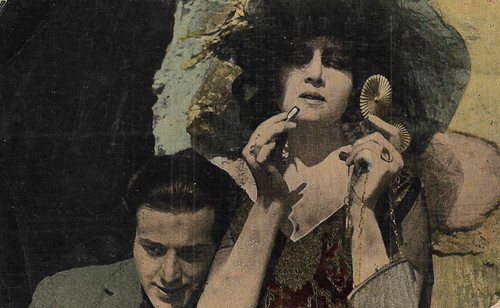
Spanish cromo by Chocolat Imperiale, Card 2 of 6. Photo: Gladiator Film / Distr. J. Verdaguer, Barcelona. Angelo Vianello and Helena Makowska in Folgore (Ugo De Simone, 1919).
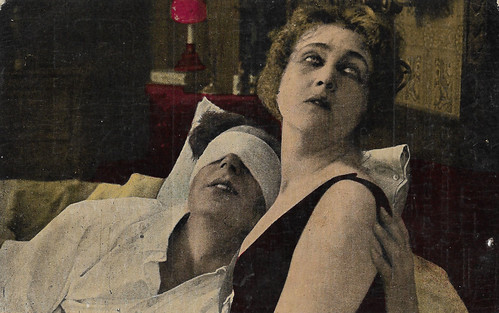
Spanish cromo by Chocolat Imperiale, Card 3 of 6. Photo: Gladiator Film / Distr. J. Verdaguer, Barcelona. Helena Makowska and Angelo Vianello in Folgore (Ugo De Simone, 1919).
A gentle story of love and art
In Folgore (Ugo De Simone, 1919) a talented young composer (Angelo Vianello) humbly asks the eminent diva (Helena Makowska) her opinion about his new composition, hoping she may promote it. Detesting big city life, he quietly works on his compositions at his estate. The curious diva visits him with her friends and invites him to join her. They fall in love.
As if to castigate him for his abandonment and new frivolous life, nature blinds him with a lightning bolt (hence the film's title). His beloved steals his last successful composition, called 'Folgore' (Lightning), and tries to sell it to a rich friend of the artist (François-Paul Donadio) who is also a musician, but the latter discovers the infamy and rejects it. The diva returns to her own life but now regrets her misstep. She wants to confess her guilt to the composer and return the manuscript, just when he is about to commit suicide. When trying to prevent him from his act, she dies herself.
Folgore had sets by Filippo De Simone and cinematography by Luigi Florio. Director Ugo De Simone was known for such Gladiator Film productions as L'amazzone macabra (1916), La figlia della tempesta (1917) and Maternità (1917), all starring another silent film diva, Italia Almirante-Manzini.
The premiere of Folgore (Ugo De Simone, 1919) happened in Rome on 29 January 1919, but on 7 August 1918, the critic of the journal La Vita Cinematografica already wrote a positive review of the film: "A gentle story of love and art, gracefully drawn, tastefully scripted and executed by a trio of actors who know their stuff. There is, in the whole and in the details, a search for the best, an aspiration to modernity and a sense of progressiveness, which show that lessons (which today, unfortunately, come to us from foreigners) benefit those who are not so infatuated with themselves as to believe themselves superior to any foreign inducement. [...]
We note with pleasure that Vianello is among the actors who show the most promise, and we do not spare Makowska praise, who is much better and much more effective than she was in a very recent time. Fine as always is Donadio, a mature and assured actor."
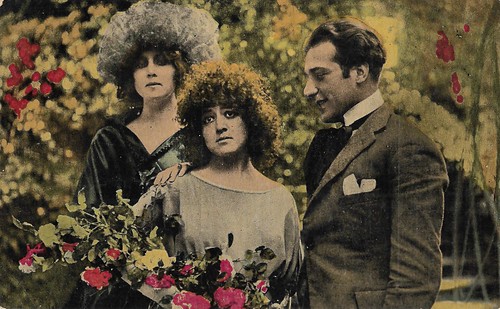
Spanish cromo by Chocolat Imperiale, Card 4 of 6. Photo: Gladiator Film / Distr. J. Verdaguer, Barcelona. Helena Makowska and Angelo Vianello in Folgore (Ugo De Simone, 1919).
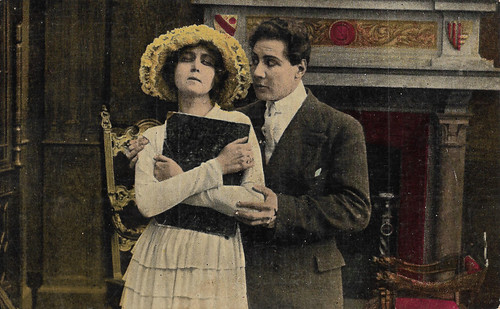
Spanish cromo by Chocolat Imperiale, Card 5 of 6. Photo: Gladiator Film / Distr. J. Verdaguer, Barcelona. Helena Makowska and François-Paul Donadio in Folgore (Ugo De Simone, 1919).
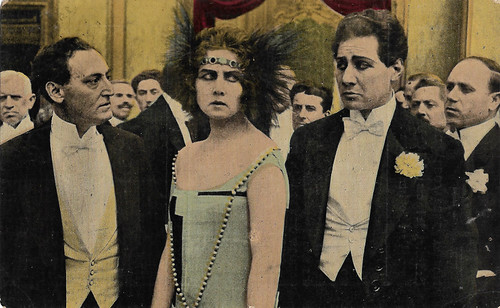
Spanish cromo by Chocolat Imperiale, Card 6 of 6. Photo: Gladiator Film / Distr. J. Verdaguer, Barcelona. Helena Makowska and, right, François-Paul Donadio in Folgore (Ugo De Simone, 1919).
Sources: Vittorio Martinelli (Il cinema muto italiano, Vol. 1918), IMDb and the cards themselves.
No comments:
Post a Comment